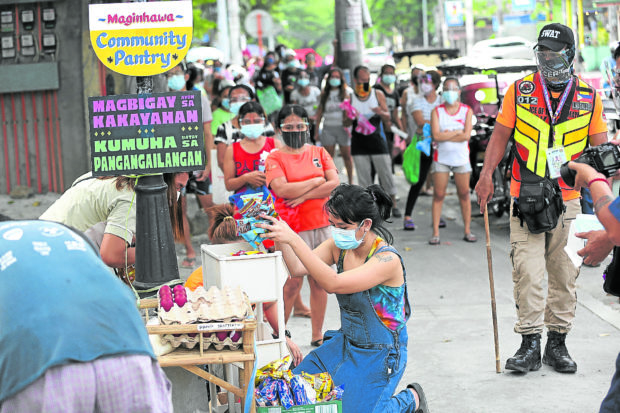
People line up to get free food supplies at the Maginhawa community pantry in Teacher’s Village, Quezon City, on Saturday, April 17, 2021, after the project went viral this week as more people donate food stock on a small shelf where underprivileged people can access it but are told to only get what they need. INQUIRER PHOTO / NIÑO JESUS ORBETA
MANILA, Philippines — To address the “glaring gaps” in the government’s response to address hunger amid the COVID-19 pandemic, Senator Risa Hontiveros on Wednesday filed a bill that seeks to institutionalize community pantries in the country.
In Senate Bill No. 2126 known as the “Ensuring Zero Hunger for All Filipinos,” Hontiveros states that there are “glaring gaps” in the domestic legislation ensuring freedom from hunger. Among the gaps is the fact that the country does not have a legal framework governing the right to adequate food.
These gaps, according to the senator, lead to economic and political uncertainties that make the poor more vulnerable to hunger and malnutrition, especially amid the pandemic.
Hontiveros said that the said bill will make the state take the appropriate steps in ensuring the realization of every individual’s right to food.
“Itutulak ng Zero Hunger Bill ang gobyerno upang unahin ang problema sa gutom at ang karapatan ng bawat Pilipino sa pagkain lalo ngayong marami sa ating mga kababayan ay naitulak sa kahirapan,” Hontiveros said.
Hontiveros said the bill will task the state to design policies and programs that encourage and promote “the private citizen’s active participation” such as through food banks and community pantries.
“Food banks and community pantries should be institutionalized so they can get the right amount of support from the government to serve and reach more people in need,” she said.
With the said bill, the government and all its instrumentalities would be compelled to work together across “portfolio boundaries” to achieve an “integrated response to eliminate hunger.”
She added that the bill will also reexamine existing policies regarding exploitation and management of resources.
Once passed, a Commission on the Right to Adequate Food will also be established as the primary policy-making and coordinating body to guarantee the full exercise of the right to adequate food.
A “National Food Policy” would be formulated by the Commission which will serve as a nationwide framework of programs that will address hunger, help achieve food security, improve nutrition and promote sustainable agriculture.
Hontiveros explained that through the adoption of a National Food Policy, the government will be held more accountable as any violation of the right to food will be punishable by law.
“The real health disaster is still ahead of us. It will not be enough to provide short-term solutions. There should be a long-term perspective to strike at the root of the problem to be able to provide a secure future and ensure the right to food for everyone,” Hontiveros said.
“This proposed law will pave the way for inclusive, social, equal, and sustainable growth and development to ensure that there is enough food available for all Filipinos,” she added
On April 1 last year, just 15 days after the first enhanced community quarantine was implemented in the country, residents of Sitio San Roque, Quezon City, and members of the Samahan ng Magkakapitbahay staged a rally demanding the government to provide them with food aid.
A year after, on April 14, a small business owner in Diliman, Quezon City, set up a shared pantry in hopes of helping her community amid the worsening COVID-19 pandemic.
This inspired similar initiatives to sprout everywhere from Metro Manila to almost every other region of the country.
Several officials have lauded the initiative, with some saying that the initiative is a sign of the government’s slow response and its need to “step up.”
RELATED STORIES:
Community pantry: ‘Not charity, but mutual aid’
Community pantries ‘wake up’ call for gov’t to ‘do more’ — Poe
Community pantries a sign of ‘desperation’ — Lacson
Community pantries fill gaps amid ‘absent’ gov’t — Ex-VP Binay